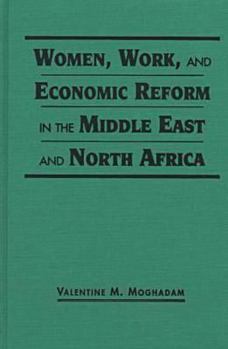Women, Work, and Economic Reform in the Middle East and North Africa
This work explores the connections between gender relations and economic reform in the Middle East and Africa. The book begins with an overview of the political economy of women's employment and... This description may be from another edition of this product.
Format:Hardcover
Language:English
ISBN:1555877850
ISBN13:9781555877859
Release Date:January 1997
Publisher:Lynne Rienner Publishers
Length:259 Pages
Customer Reviews
1 rating
Impressive
Published by Thriftbooks.com User , 19 years ago
This book presents an encyclopedic overview of gender and employment in selected countries in the Middle East and North Africa (Morocco, Tunisia, Turkey, Egypt, Jordan, Syria, Iran, and Algeria). The author gathers and analyses economic statistics from a wide range of published sources; she also includes data from her own fieldwork. The countries covered are each taken up in separate chapters (although Morocco and Tunisia form a joint chapter, as do Jordan and Syria). Moghadam describes how the factors of educational attainment, cultural restrictions, and economics (need for family income, as well as the labor market) determine whether a woman can and will work. In the beginning chapters of the book (Morocco and Tunisia, Turkey), she gives a pointed emphasis to economic factors, perhaps because these can be firmly supported with economic data. By the time she describes Algeria, however, she seems to place more emphasis on cultural factors. Perhaps this shift from economic factors to cultural factors was the basis for ordering the chapters in the way she did, although she does not state this explicitly. If Moghadam had included the richer Gulf states in the study, she might have been forced to address the competition between the factors more directly. In the richest Gulf States, women often attend school equally as long as men do, but their participation in paid employment is even lower than that of Jordan or Algeria. Thus it would seem that economic need and space in the labor market are both required in order to overcome cultural restrictions against women working outside of the home; education alone will not get a woman a job. If, however, the cultural restrictions are overcome by economic factors, then education will help a woman find work and security.





